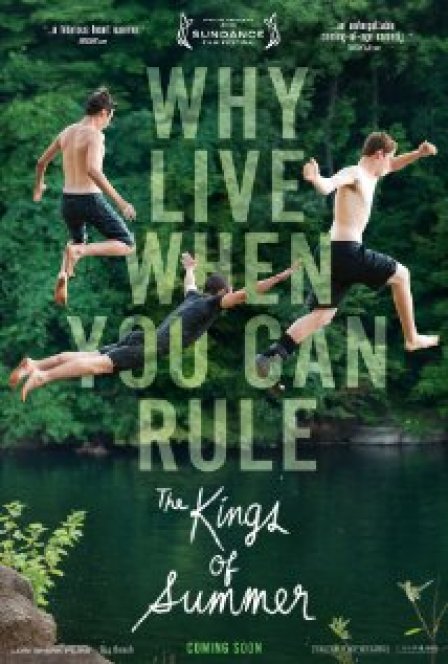If memory serves, Wes Anderson said of Rushmore that he intended to make the kind of movie that would have been his favorite when he was a 15-year-old Max Fischer type. And, as you already know, he and his muse Jason Schwartzman hit all the right notes, capturing the eccentricity and discomfort and joys of that age perfectly.
There’s a sense that writer Chris Galletta and director Jordan Vogt-Roberts were attempting the same thing with The Kings of Summer but pull from the wrong batch of source material to create their vision. Anderson’s milieu was informed by the European school of filmmakers, with the itchy energy of various nouvelle vague and Italian influences coming to bear on the film’s visuals. Too, his script with Owen Wilson felt stitched with the colors of vintage coming-of-age stories like the early Antoine Doinel films of Francois Truffaut, and Hal Ashby’s The Landlord and Harold and Maude.
The creators of The Kings of Summer, on the other hand, aim for more strictly American visions, not all of them compatible. The visual aesthetic of the film has a strange Terence Malick-type quality that feels at odds with the its otherwise clear-cut, Apatovian feel. The middle section of the film is littered with sun flare-infused shots of the three main characters Joe (Nick Robinson), Patrick (Gabriel Basso), and Biaggio (Moises Arias) looking wistful as they fight with sticks or jump into a river.
Galletta opts for the buddy comedy ideals of The Hangover and Superbad, putting two straight men alongside one wild card and then expecting the comedic sparks to start flying. And sometimes, that works, thanks to the overall winning performances by Robinson and Basso. The two play high school best friends who decide to escape their supposedly stifling home lives by building their own home in a secluded forest clearing. Robinson, especially, does an impressive job embodying that mixture of bravado and gangly uncertainty that comes for young men in their teen years (which makes sense considering he only just turned eighteen). When reality inevitably steps in the way of this dream life the two have envisioned — yes, it does include a pretty girl — the realization plays across his face and body deeply. The only wild card in the mix is Biaggio, a McLovin/Alan from The Hangover mix injected into the film for his clown-like qualities. Arias does as well as one can with such a one-note character, but his presence simply reveals the self-consciousness of Galletta as a screenwriter. The film could have been just as funny and potentially warmer without his weird intrusions and non-sequiturs.
That same sense comes through with everything surrounding the three boys in the woods. With no confidence in the core storyline, the film’s edges are crammed with throwaway characters brought in to drop a quick joke or to unnecessarily edge the plot forward, and this pattern extends even to the parents that Joe and Patrick are trying so hard to wrench themselves free from. Nick Offerman and Megan Mullaly — playing Joe’s dad and Patrick’s mother — look as if they were shoved in front of the camera and told to just do what they always do. They follow suit, with Offerman playing the stern stick in the mud and Mullaly doing her best flighty housewife. While intermittently funny, it’s nothing we haven’t seen before.
Actually, that last sentence is nice summation of The Kings of Summer as a whole. Vogt-Roberts and Galletta elicit a few chuckles, but bring little new to the table. This film may very well find an audience with teens who feel that they are swimming against the tide of everyday life, and for that I applaud the filmmakers. But I would also urge any of those viewers use this as a leaping off point into the cinematic universe that does a much sharper job reflecting the true heart of adolescence.

